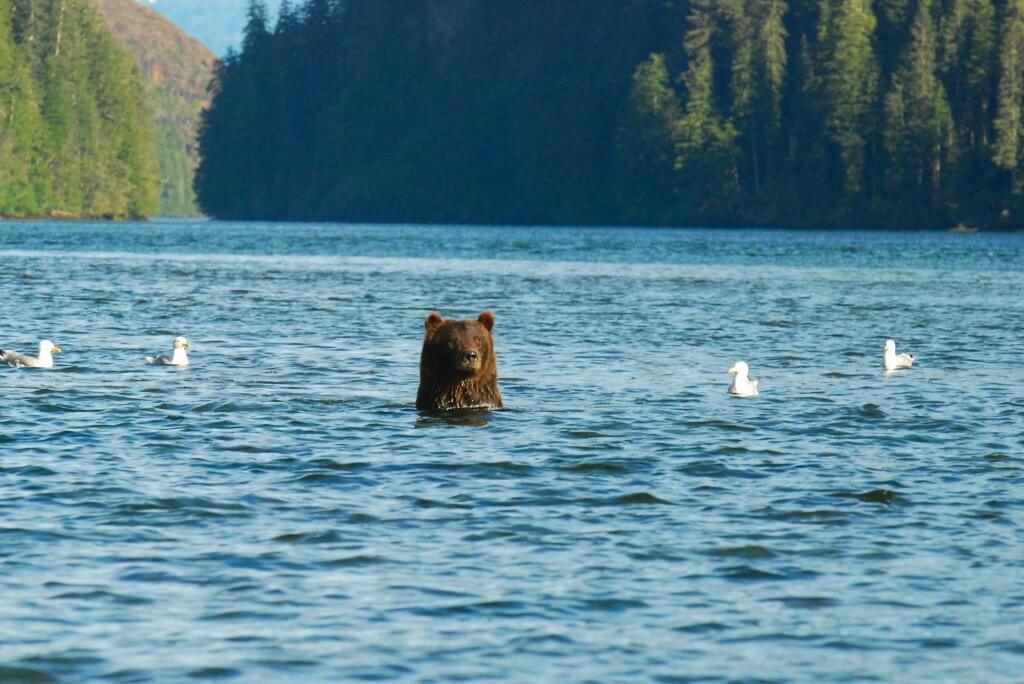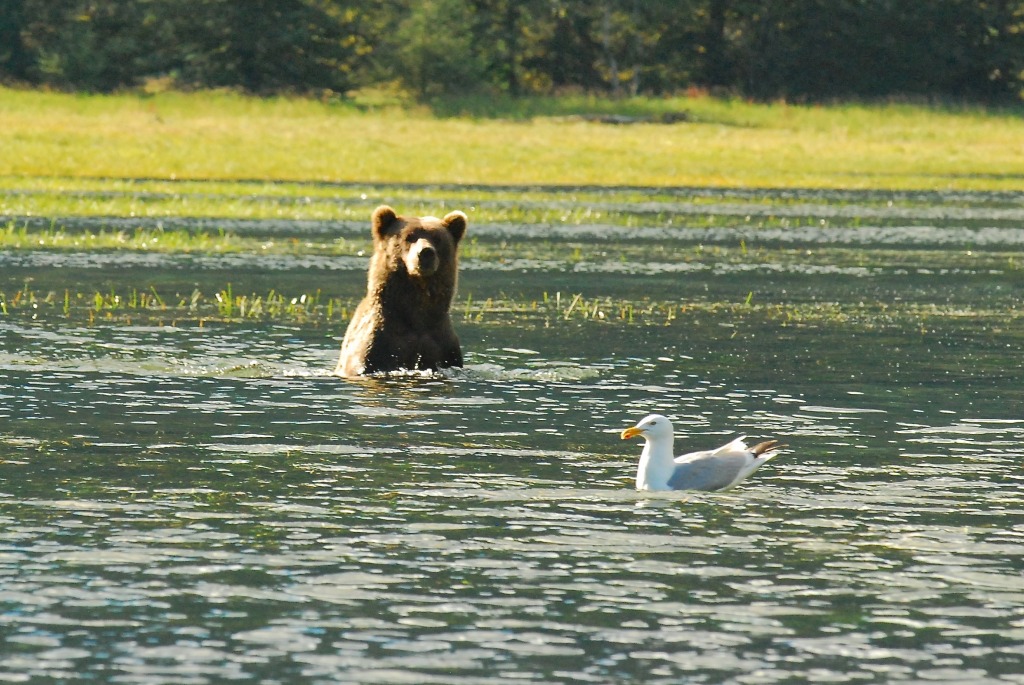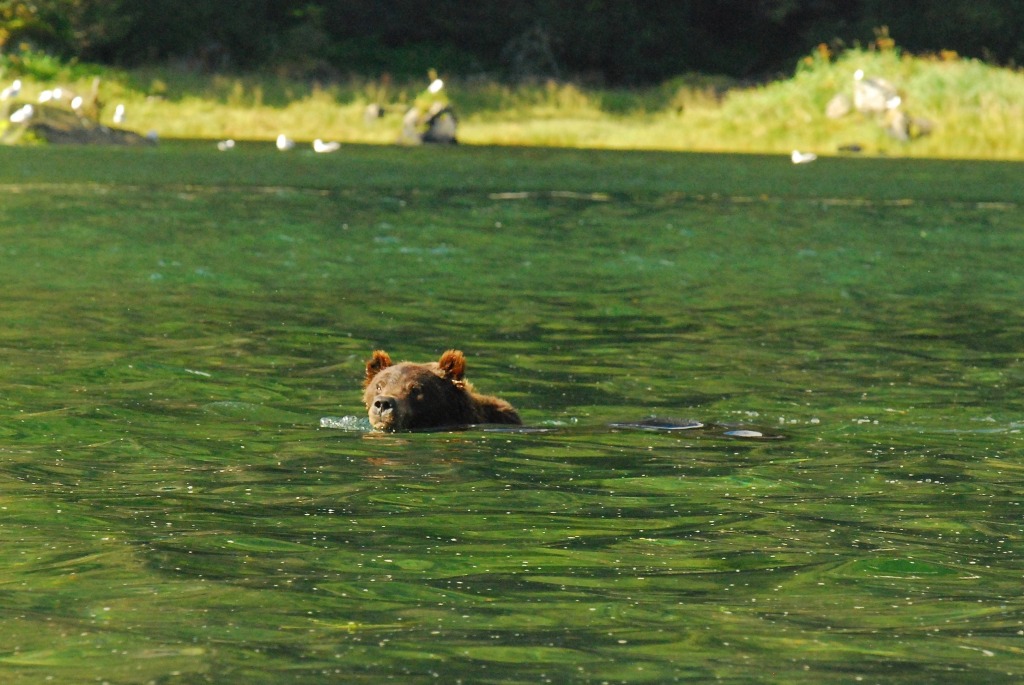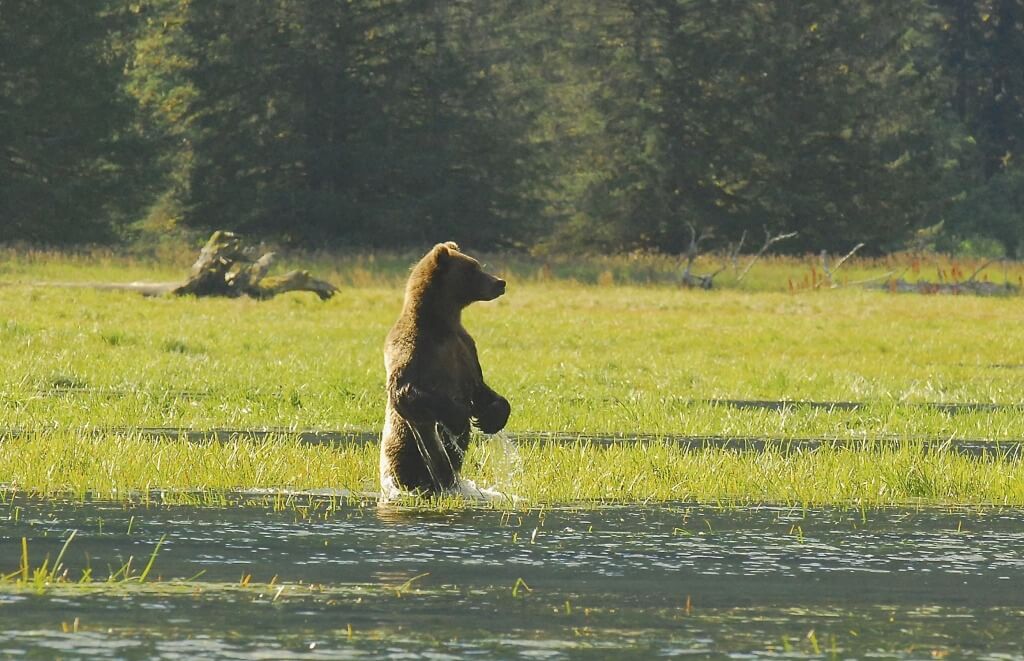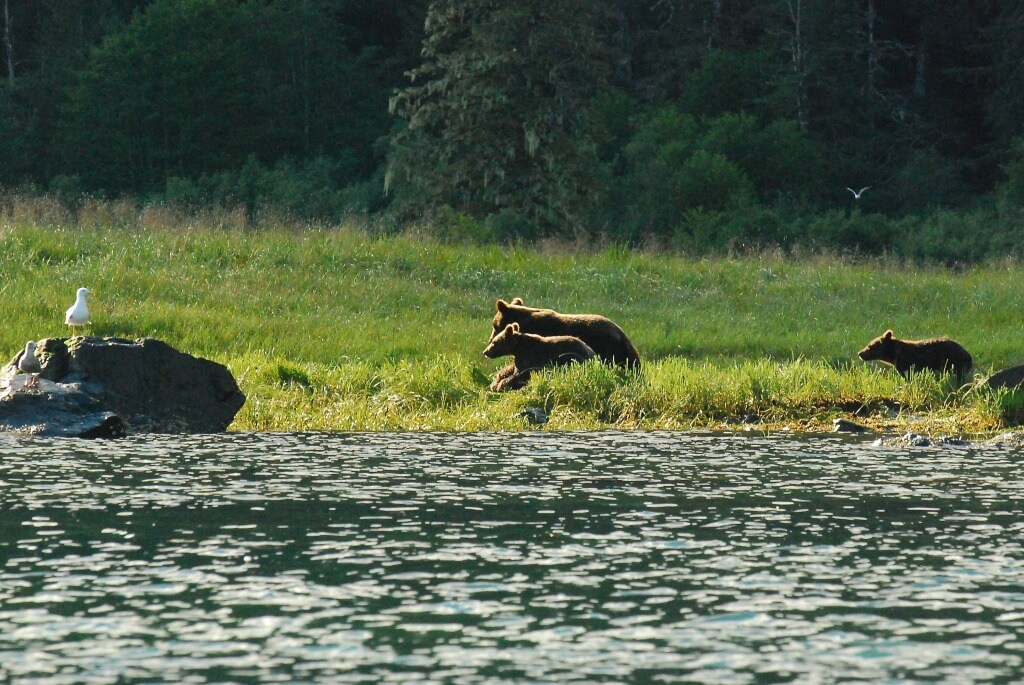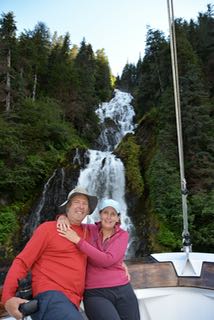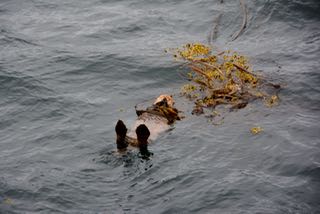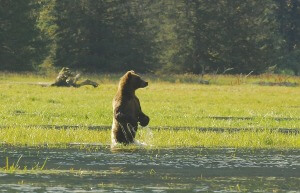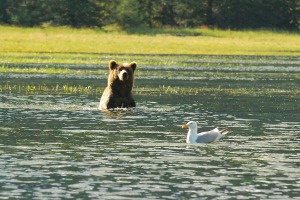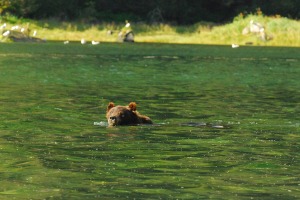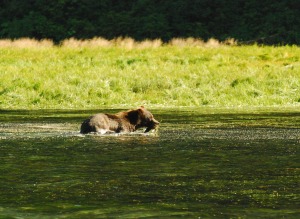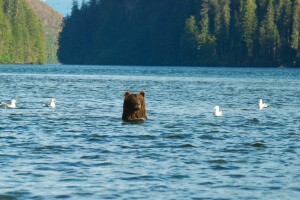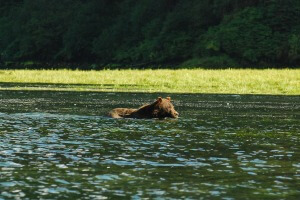After
going through all the wonderful photos from our past seasons in Alaska,
I was pleasantly surprised to find more than just a few photos of
grizzly (brown) bears swimming and/or playing in the water. Most of
these photos are from the beautiful bays on the eastern side of Baranof
Island. Grizzly bears are fantastic swimmers, and we have watched them
many times pursuing salmon, or crossing a bay or stream with enthusiasm.
Tuesday, December 8, 2015
Tuesday, October 20, 2015
Another Great Alaskan Summer Aboard Ursa Major!

We just wrapped up yet another great summer in Alaska, the 15th season for Ursa Major! Our
last three Alaska Adventure trips of the season were a wonderful mix of
paddling, hiking, and wildlife viewing. The humpback whales were out
in abundance, and were quite active in both their feeding and cavorting.
 | |||||||||||||||||
Denning, Sherry, David, and Kathy relaxing in the salon aboard Ursa Major after an afternoon of paddling and whale watching.
|
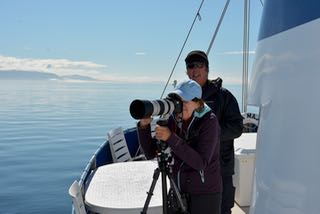
Tori and Rob viewing humpback whales near Pybus Bay, Admirality Island, Alaska.

Humpback whale breaching in Chatham Straight, Alaska.

Pulling up our Dungeness crab pots at Deep Bay, Chichagof Island, Alaska.

Jane and Ben, from the U.K., paddling in the Magoun Islands State Marine Park near Sitka, Alaska.

Ben with his first Alaskan salmon ever! Way to go Ben!!!
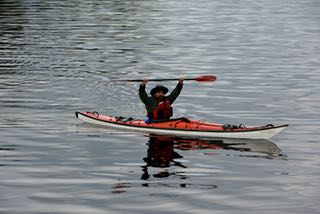
Captain Josh out for a paddle on our last Alaska Adventure trip of the season!!!
Thursday, October 15, 2015
Sumdum Glacier in Tracy Arm/Ford's Terror Wilderness Area, Alaska
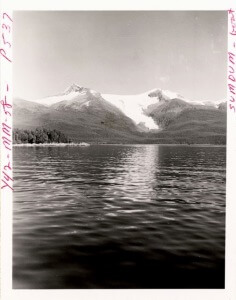 |
| Sumdum Glacier. 1958. Millett, Marion T.. From the Glacier Photograph Collection. Boulder, Colorado USA: National Snow and Ice Data Center. Digital media. |
 |
| Sumdum Glacier. 2015. Ursa Major Charters. Digital media. |
Our
5th trip to Tracy Arm/Ford's Terror Wilderness Area of 2015 brought
with it clear views of Sumdum Glacier. This was the 3rd trip aboard
Ursa Major for our fearless travelers from Ohio and Indiana, and their
first to Dawe's Glacier in Endicott Arm. On their 2nd trip with us in
2013, we visited Sawyer and South Sawyer Glaciers in Tracy Arm. On this
trip into Endicott Arm, we also had the pleasure of anchoring in one of
our favorite places, Ford's Terror. The tidal drop in Ford's Terror
was 22 feet during our stay there, and we were treated to visits by
numerous harbor seals, pigeon gillemots, and harbor porpoise while at
anchor.
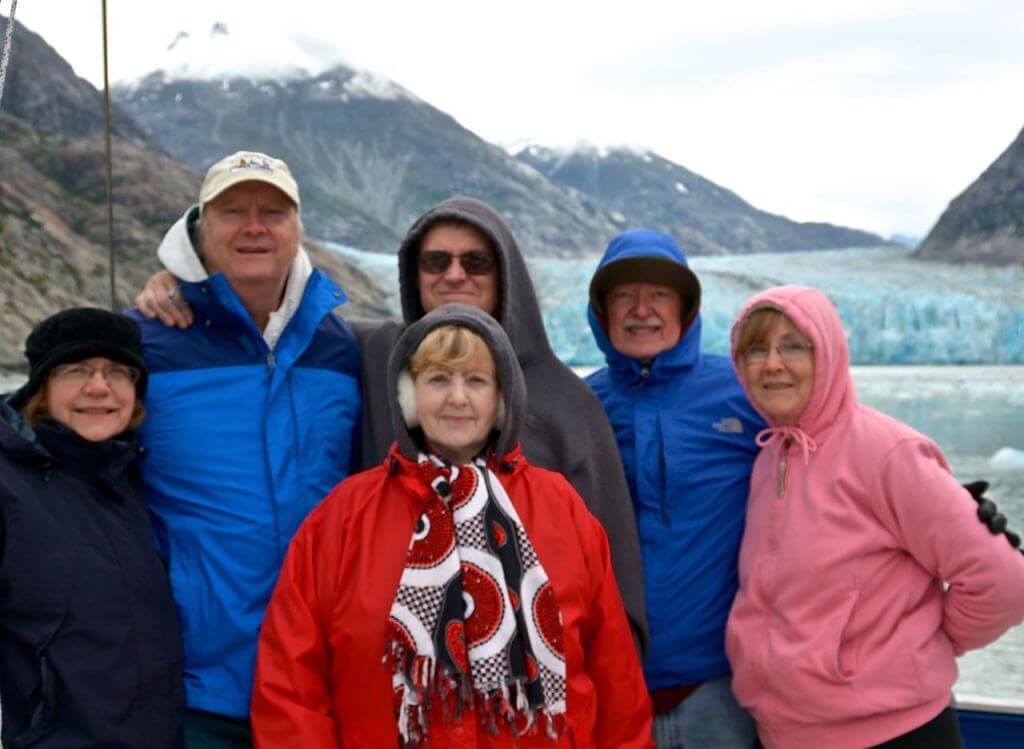 |
| Our fearless group of 3rd time visitors to Ursa Major! Welcome back to Alaska! |
Tuesday, August 4, 2015
Stellar Sea Lion Research Trip
Following our Summer Solstice trip, Ursa Major was the mothership
for an Alaska Department of Fish and Game Stellar Sea Lion research trip
in southeast Alaska. Over the course of the 16-day trip, we traveled
to a wide variety of Stellar Sea Lion haulout and rookery sites, some of
which were new to us, and very much off the beaten path of our usual
cruising grounds amongst the beautiful islands of southeast Alaska. It
was an amazing trip for everyone!
The Alaska Department of Fish and Game crew!
Tuesday, July 14, 2015
Summer Solstice in Tracy Arm/Ford's Terror Wilderness Area, Alaska
Our annual
Summer Solstice trip brought us to Tracy Arm/Ford's Terror Wilderness
Area for paddling amongst the floating ice. We visited North and South
Sawyer Glaciers in Tracy Arm with our guests for the week, George and
Polly, celebrating their honeymoon aboard Ursa Major.
George and Polly are seen here relaxing in the Alaskan sunshine in Frederick Sound, where an enthusiastic group of 25-30 humpback whales joined us for lunch. While George and Polly enjoyed Alaskan B.L.A.T. sandwiches on the sundeck of Ursa Major, the humpback whales were observed feeding via single bubble net.
George and Polly spent hours on the bow of Ursa Major photographing wildlife such as humpback whales, Dall’s porpoise, Stellar sea lions, harbor porpoise, harbor seals, and a wide variety of birds.
George and Polly are seen here relaxing in the Alaskan sunshine in Frederick Sound, where an enthusiastic group of 25-30 humpback whales joined us for lunch. While George and Polly enjoyed Alaskan B.L.A.T. sandwiches on the sundeck of Ursa Major, the humpback whales were observed feeding via single bubble net.
George and Polly spent hours on the bow of Ursa Major photographing wildlife such as humpback whales, Dall’s porpoise, Stellar sea lions, harbor porpoise, harbor seals, and a wide variety of birds.
Tuesday, June 16, 2015
Humpback Whales Bubble Net Feeding
We saw our very first humpback whales bubble net feeding of the
season last week aboard Ursa Major! There were six individuals working
together via social cues to collectively herd herring. Before emerging
from the water as a group, these humpback whales exhaled air from their
blowholes as they swam in a spiral formation. The trapped exhaled air
forms a roughly cylindrical bubble net, or trap. In the above photo,
the humpback whales are emerging from the water after following their
bubble net to the surface in an attempt to catch as much herring as
possible in one gulp. For more information on humpback whales in
Alaska, please visit the website of the Alaska Whale Foundation, (a
nonprofit organization dedicated to the conservation of Alaskan marine
mammals), by clicking HERE.
After three weeks of hanging the hummingbird feeder on Ursa Major, we saw our first rufous hummingbirds of the season. We encountered a "swarm" of them in Warm Springs Bay, Baranof Island, and enjoyed watching them battle one another and empty the feeder multiple times.
Rufous hummingbirds migrate north to southeast Alaska in the late
spring/early summer from Mexico, and usually leave Alaska by September
to migrate back to Mexico for the winter. They remain in southeast
Alaska long enough to enjoy the short bloom cycle of the wild flowers
here in the summer.
Our guests on this week's trip, Scott and Joan, of Vancouver,
Washington, seen here at Kasnyku Falls, near the Hidden Falls Hatchery
on Baranof Island, Alaska.
After three weeks of hanging the hummingbird feeder on Ursa Major, we saw our first rufous hummingbirds of the season. We encountered a "swarm" of them in Warm Springs Bay, Baranof Island, and enjoyed watching them battle one another and empty the feeder multiple times.
Sunday, June 14, 2015
Saturday, June 6, 2015
The Waterfall Coast of Baranof Island
We just wrapped up a truly amazing trip
to the Waterfall Coast of Baranof Island, and to Tracy Arm to view
calving glaciers. Our guests this week on Ursa Major were from New
Zealand and Australia, and we enjoyed beautiful paddles, hikes, and hot
springs.
Sawyer Glacier, Tracy Arm, Alaska with our guests Bev, Gordon, Shan, and Tony
Takatz Bay, one of many beautiful anchorages on the Waterfall Coast of Baranof Island
Paddling in Ushk Bay, Peril Straight, with Gordon and Bev
Hiking in the Brothers Islands, Stevens Passage, on our trip last week
Petersburg, Alaska with Tony and Shan
Monday, May 25, 2015
Ursa Major returns to Alaska!!!
Our early May arrival in Alaska for our
charter season allowed us to experience the best of the early summer
here, including the Little Norway Festival in Petersburg, Alaska, and
the Memorial Day celebrations in Sitka, Alaska. Petersburg and Sitka
are two of our favorite towns in southeast Alaska, and we utilize both
towns our departure and arrival points for our charters.
We made our Alaska landfall aboard Ursa Major in Ketchikan, Alaska
Little Norway Festival; May 14-17, 2015; Petersburg, Alaska
Little Norway Festival; May 14-17, 2015; Petersburg, Alaska
Little Norway Festival "Lop the Loop" 7K Run; May 14-17, 2015; Petersburg, Alaska
Little Norway Festival "Lop the Loop" 7K Run; May 14-17, 2015; Petersburg, Alaska
Sitka, Alaska this morning with Mt. Edgecombe in the background
Friday, March 20, 2015
Our Favorite Alaskan Brown Bear Photos
These are some of our favorite photos of Alaskan Brown Bears, all of
which were taken from Ursa Major. The cubs in photo #1 should be full
grown this year. We’ll may see these guys again in Red Bluff Bay,
Baranoff Island, Alaska.
Alaskan Brown Bear, with 2, 2 year old cubs. Her cubs have grown to nearly her size. They will on their own after 2-4 years with their mom.
Brown bears are always aware of their surroundings. A brown bear will stand either to intimidate or to better see any threats around them.
He may be thinking he can catch that seagull. No one would blame him for taking an easy snack. The seagull can’t taste as good as salmon, but you take what you can get.
The Brown bear is a powerful swimmer. They will cross streams, bays and even much larger bodies of
water as they roam, looking for the first salmon runs of the year.
Brown Bear, eating salad before the main course, salmon! Early in the summer bears will forage on grasses and berries as they wait for the salmon to arrive.
Brown Bear swimming in Red Bluff Bay, Alaska. This healthy, fat bear is standing in 6-8 ft. of water, and is well insulated for the cold Alaskan waters.
Alaskan Brown Bear. No salmon in this stream yet, better luck tomorrow.
Birding in Alaska
It’s about that time of year again here in western Washington. We
beginning to see migratory birds resting and feeding here on their way
to Alaska. The Ursa Major won’t be far behind them as we head north to
Alaska from Seattle on May 1.
Two bird species of interest that come to mind as more permanent to
southeast Alaska are the black oystercatcher, (seen in the above photo),
and pigeon guillemot. Neither bird is considered as glamorous as the
bald eagle, or the elusive tufted or horned puffins we find in southeast
Alaska, but they remain among our favorite bird species to observe.
Both the black oystercatcher and pigeon guillemot have their place
in the food web in southeast Alaska, and we see them often from the Ursa
Major (and our sea kayaks!) on the rocky shores of the islands of
Frederick Sound, (north of Petersburg). In the case of the black
oystercatcher, its long, sharp orange bill is used to extract delicious
creatures (such as oysters) from the rocky intertidal zone, providing an
abundance of food for this keen bird.
Pigeon guillemots on the other hand, (seen in the above photo), have
black and white bodies, with bright orange feet. They appear as
awkward fliers when they initially are attempting a water launch, but
are effective and graceful swimmers as they search for bait fish and
other food near their nests. Pigeon guillemots typically nest above the
high tide mark on rocky shores to have the best perspective on both
prey and predators. At night, they typically call out to each other,
and their gentle voices make for some of the best sounds to fall asleep
to.
On a side note, we also see two migratory hummingbirds species in
southeast Alaska in the summer, the rufous and Anna’s hummingbird (less
common). The above photo of two male rufous hummingbirds visiting our
hummingbird feeder aboard Ursa Major was taken during a fight over the
feeder. Rufous hummingbirds do not remain in southeast Alaska long after
their arrival in late May, with the females and their young departing
as early as July for their winter grounds in Mexico, followed by the
males in mid-August.
Subscribe to:
Comments (Atom)
